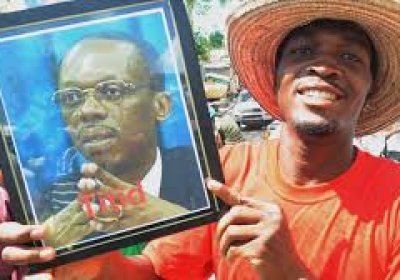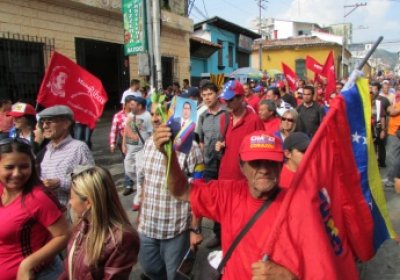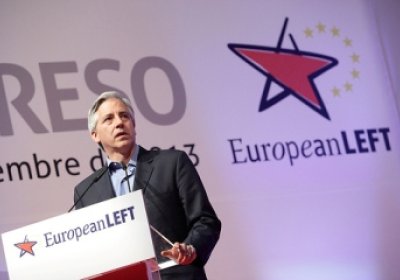The Spanish government’s response to the move by armed Basque pro-independence organisation Basque Homeland and Freedom (ETA) to put its weapons beyond use has clearly demonstrated it favours continuing conflict over peace.
On February 21, ETA released a video showing two of its members meeting with representatives of the International Verification Commission. The IVC were inspecting weapons that had been put beyond operational use.
National liberation
It has been 10 years since the February 29, 2004, coup d’etat that ousted the democratically-elected government of Jean-Bertrand Aristide in Haiti.
Paramilitary groups ― including many former members of Haiti’s disbanded army and CIA-funded death squads ― engaged in a campaign of violence directed against supporters of the government and the Haitian National Police (HNP), for years before the coup.
Venezuela has commemorated the one year anniversary of the death of former president Hugo Chavez with rallies across the country.
Supporters of the late socialist president turned out in hundreds of thousands for official commemoration services.
In a show of support for the revolutionary process Chavez led, in Caracas crowds in red flooded the city centre for military and civil parades. Supporters of social programs launched under Chavez, along with social movements aligned with the government of President Nicolas Maduro also rallied in the capital.
Venezuelan President Nicolas Maduro announced his country was severing all diplomatic and economic ties with Panama after its government sought the intervention of the Organization of American States (OAS) into Venezuela’s domestic affairs.
The move came as the US House of Representatives approved a motion calling on countries in the region to stand in solidarity with protesters currently seeking to topple Maduro.
Maduro saidright-wing Panamanian president Ricardo Martinelli has been “actively working against Venezuela”.
Their names are Jawhar Nasser Jawhar, 19, and Adam Abd al-Raouf Halabiya, 17. They were once soccer players in the West Bank. Now they will never play sports again.
Jawhar and Adam were on their way home from training in the Faisal al-Husseini Stadium on January 31 when Israeli forces fired on them as they approached a checkpoint. After being shot repeatedly, they were mauled by checkpoint dogs and then beaten.
Ten bullets were put into Jawhar’s feet. Adam took one bullet in each foot.
With few exceptions, most international media coverage of the recent protests in Venezuela gives little sense of the response from the popular social movements who support the government of President Nicolas Maduro but operate independently from it.
As researchers who have carried out long-term fieldwork in the urban barrios (poor neighbourhoods) of Caracas, we felt compelled to translate and publish the statement of one of these barrio groups.
Almost a year has passed since the death of Hugo Chávez on March 5, 2013. Arguably this has been the most difficult one for the Bolivarian Revolution. Many people, both on the left and the right expressed doubt that there could be Chavismo without Chávez.
Perhaps a year is still too short of a period to assess the situation after Chávez’s passing. Yet, the dynamic developments over the past twelve months call for some preliminary remarks.
Throughout March, the United Nations Human Rights Council (UNHRC) will be reviewing the human rights situation in Sri Lanka, among other countries, at it meeting in Geneva.
At last year’s session, the UNHRC passed a resolution calling on the Sri Lankan government to “conduct an independent and credible investigation into allegations of violations of international human rights law and international humanitarian law”.
The armed group Basque Country And Freedom (ETA has made a significant step towards decommissioning the weapons used in its campaign for independence and freedom, Irish Republican News said on February 21. But the Spanish government immediately rejected the move.
The decommissioning by ETA of some its cache of weapons and explosives, drawing a definitive line under decades of bloody conflict, was confirmed by an International Verification Commission.
Bolivia's Vice-President Alvaro Garcia Linera, a veteran left activist and Marxist academic, spoke at the December 13-15 congress of the Party of the European Left (PEL).
The PEL unites left groups from across Europe and is running Alexis Tsipras for president of the European Commission. Tsipras is president of the Greek Coalition of the Radical Left (SYRIZA), which nearly won elections last year on an anti-austerity, pro-people platform.
Many see Australia as a small power dependent on British and then US power for protection, but it is important to note that Australia has its own imperialist agenda it pushes the Pacific region.
From the late 19th century to today, Australia's ruling class has been finding ways of extending its influence on nearby countries. It has even succeeded, if only temporarily, in gaining colonial possessions.
This began even before federation in 1901, as the new capitalist class, having accumulated capital from the gold rushes in the mid-19th century, was looking for outlets for investment.
Since the 1990s, many critics of the United States have accused Washington of promoting the dismemberment of nations such as Yugoslavia, in accordance with neoliberalism’s drive to weaken central governments and nation states.
Today, Washington’s official policy in nations like Syria and now the Ukraine has been support for rebels seeking to overthrow the government, even though their chances of success are minimal.
- Previous page
- Page 98
- Next page








